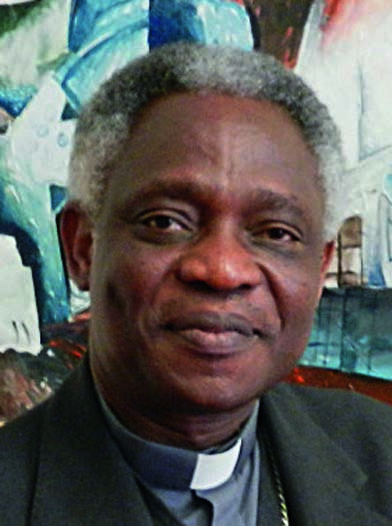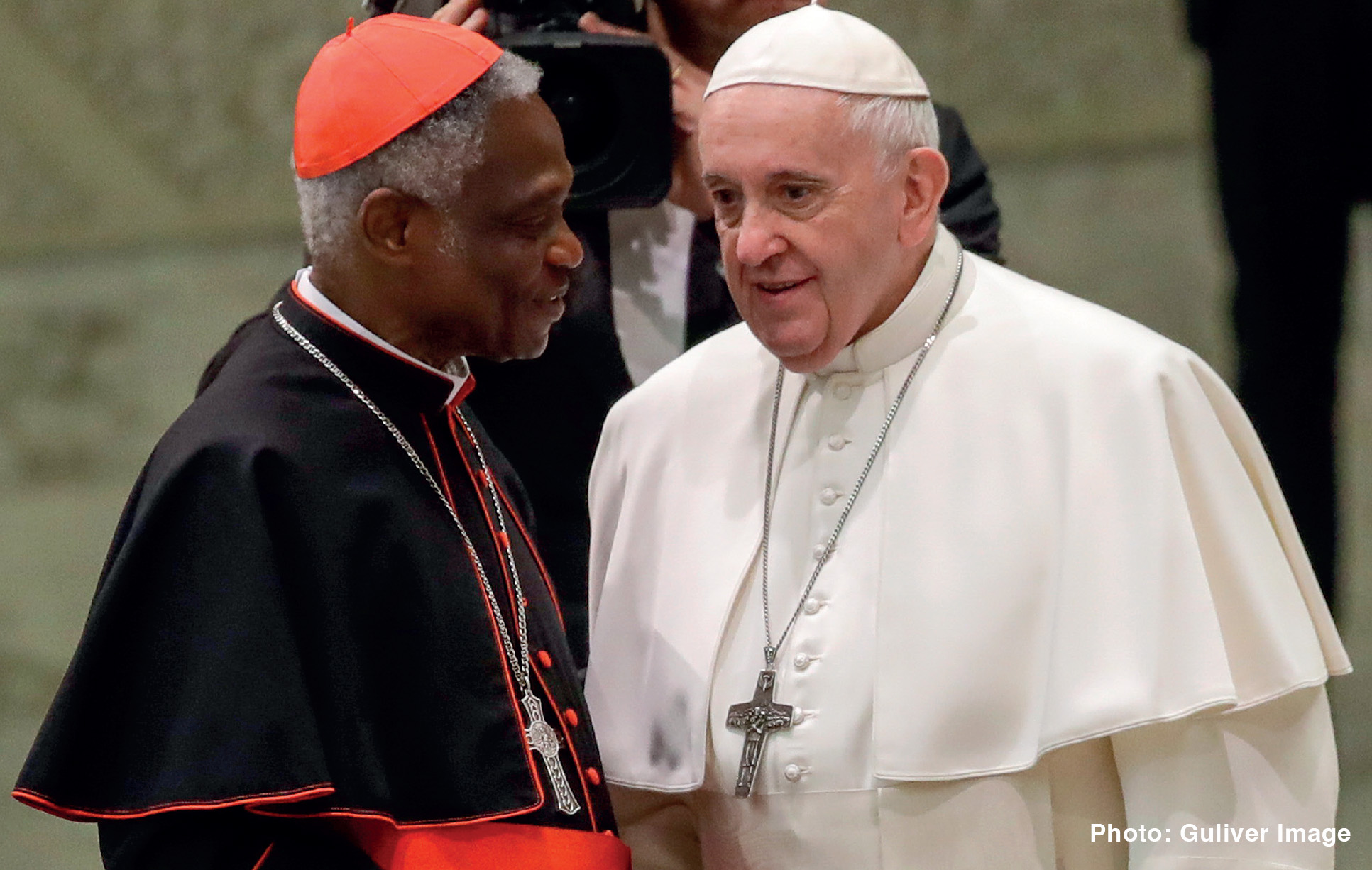 H. Em. Peter Kodwo Turkson is Chancellor of the Pontifical Academy of Sciences and the Pontifical Academy of Social Sciences, Prefect Emeritus of the Dicastery for Promoting Integral Human Development, Archbishop Emeritus of Cape Coast (Ghana), and a Cardinal of the Roman Catholic Church.
H. Em. Peter Kodwo Turkson is Chancellor of the Pontifical Academy of Sciences and the Pontifical Academy of Social Sciences, Prefect Emeritus of the Dicastery for Promoting Integral Human Development, Archbishop Emeritus of Cape Coast (Ghana), and a Cardinal of the Roman Catholic Church.
The Church, as an expert on humanity, maintains, with humble certainty, that no area of human action can legitimately claim to be outside the guidance of ethical principles based on liberty, truth, justice and solidarity; and this is also true of multilateralism!

Cardinal Peter Turkson in conversation with Pope Francis
The UN Secretary-General’s Summit of the Future has had precedents, such as the Global Green Deal. Because the global Green Deal requires huge financing, Mukhisa Kituyi, the Secretary-General of UNCTAD has observed that “meeting the financing demands of the Agenda 2010 requires rebuilding multilateralism around the idea of a Global Green New Deal, and by implication a financial future very different from the recent past.”
During the COVID-19 pandemic, when Brasilia threatened to leave the World Health Organization (WHO), Caracas accused Brasilia of threatening to leave WHO, following the example of the United States—a threat to multilateralism which is opposed to fundamental path of solidarity. (The Caux roundtable about Moral Capitalism, January 2021)
The Human Being as a Personal & Relational Being
Created in the image of God (Gen 1:27), every man, woman and child possess the dignity of personhood. The human being is essentially a person (persona); and the fundamental attribute of a person is his/her dignity. Thus, what lies at the heart of his or her being and existence is first and foremost his or her dignity, which is inalienable and, because its roots and guarantee are found in God’s design of creation and the constitutive social nature of human beings, it is equal for all human beings. This is what the subsequent biblical teaching about brotherhood (sisterhood), as the basis of the human family, underlines: the equal dignity of all persons. No person has more dignity than the other. That is why the first article of the Universal Declaration of Human Rights (originally published on December 10th, 1948) recognizes that dignity is equal for all human beings; and it is the dignity of persons which enables them (human beings) to enter into and to exist in relationships.
But there is another lesson that the biblical account about the brotherhood of Cain and Abel teaches. Between brothers who are equal in dignity, their relationship role is to care: to watch over each other, as it were. This, at least, is how Cain presents his responsibility towards his brother, Abel: “Am I my brother’s keeper” (shomer). When the birth of brothers (and sisters) from the same womb (adelphoi) establishes the equality of their dignity, it also enjoins on them the task or responsibility of “caring” for each other, and the killing of any person is a fratricide!
Additionally, the dignity of persons does not depend on a political power or on any other power on earth. The dignity of the human person precedes and surpasses all human institutions, including religion, which must be rather at its service. But, most importantly for the theme of our contribution is the fact that people’s recognition and understanding of their own transcendent dignity should dispose them to learn not to be satisfied with only themselves but to encounter their neighbor in a network of relationships that are evermore authentically human. This is not only the source of human rights and duties; but people’s recognition and understanding of their dignity should make them commit to the common good, the wellbeing of one and all and the unique and distinctive contribution each one can make towards the common good of all. This is how human fraternity in the Church’s Social Thought underlies multilateralism! For, the good of each person, of the whole person, especially in his/her threefold fundamental relationships (physical-natural, social and spiritual), and of all people expresses a group’s or a community’s aim or responsibility to ensure the conditions that guarantee the personal, familial, and associative good of its members, allowing them to live a dignified life and to realize their full and personal integral development.
This was envisioned by Aristotle who taught the responsibility of each member of society to promote the common good and the welfare of all. For him, the “ends” pursued by people in their actions are all “goods” that contribute to the common good, because they serve to build the polis, which involves the entire community. Pope Francis, on his part, calls for “states and civil institutions that ... are primarily concerned with individuals and the common good,” grounded on social friendship and social charity.
So, the common good serves as a compass for orientating the collaborative action of people in society, so that their action is always directed towards the good of both the person and of the community to which they belong. The collaborative actions of members in a society/community/nation to work for the human dignity and common good of its members affirm and illustrate the constitutive social nature of human beings, and their vocation to integral development through solidary humanism.
Multilateralism as Living out Solidary Humanism
It is the dignity of persons which enables them (human beings) to enter into and to exist in relationships to cooperate for the wellbeing of all. Again, it is people’s recognition and understanding of their own transcendent dignity which dispose them to learn not to be satisfied with only themselves but to encounter their neighbor in a network of relationships that are evermore authentically human; and it is religion and the faith tradition of people which contributes this sense and understanding of the transcendent dignity of the person.
Thus, if dignity & common good express a responsibility and commitment to the wellbeing of others in community, their actual realization, sometimes identified as solidarity, is governed by two principles in Catholic social teaching which, however, are not opposed: justice and love. Justice would have us give to the other what belongs to him/her, while love would have us give to the other even what is ours. Common good thrives on and is motivated by both justice and love, which in Christ are inseparable.
The Ethics of Fraternity and Multilateralism
In the last of the eight chapters of his Encyclical Letter, Fratelli tutti, Pope Francis observes that “the different religions make a valuable contribution to the building of fraternity and to the defense of justice in society.” But it is precisely this fraternity that is at stake. The visionary key word to the whole text of the Pope appears relatively abruptly in the middle of the text: It is about a “spirituality of fraternity,” which admittedly, according to the Pope’s firm conviction, must go hand in hand with a “more effective worldwide organization and practice of multilateralism to solve the urgent problems of the abandoned who suffer and die in the poorer countries.”
But the path goes, strictly in an Augustinian direction, from the inside to the outside, from spirituality to institutional ethics, from the private virtue of mercy to the public law of good and just politics, once again in Augustine’s view: from forum internum to forumexternum, from the inner to the outer marketplace, or also: from conscience to legislation.
This means that in the consideration of multilateralism as an expression of fraternity and social friendship, there is an ethical issue: the functioning of multilateralism is as good as the people who embrace it and endeavor to keep it alive and free of corruption.
In other words, and according to the firm conviction of the papal magisterium in the field of social ethics: every social state and every public commitment and action need a kind of spirituality, a state of mind that underlies all action—“agere” of the moral man in contrast to the merely manufacturing/functional “facere” of the manual man, the notorious “homo faber.” For Fratelli tutti, this is fraternity, in Christian terms: the simple recognition of the revelation of faith that every human being is a child of God, unconditionally willed by God, whose soul is allowed to develop holistically in the medium of body and time. Or, in other words, the innermost essence of social ethics is love. John Paul II would probably have called it personalism and Pius XI solidarism. And both would have said: Man according to Christian understanding is an individual and a social being. He is a person with an unmistakable face and character, always and constantly dependent on other persons—in relationship with them and, at the same time, responsible for them. Man is responsible as a person for his inner virtues, which are to shine outwardly (personare) for the improvement and sanctification of the world on God’s behalf. Man in his innermost being is predisposed to love; he lives in personhood and solidarity; and multilateralism may not only express gestures of solidarity, but the living out of a vocation to living the Spirituality of fraternity in love.
Pope Francis speaks of this, citing Caritas in veritate, that while reason by itself is capable of “conceiving equality among men and collaborating to establish civil coexistence, it does not succeed in creating fraternity.” This is because, fraternity or brotherhood cannot be achieved without transcendent truth: “when transcendent truth is not recognized, the violence of power triumphs and everyone seeks to the utmost to make use of the means at his disposal to impose his/her interest and opinion without regard for the rights of the other.” Here precisely, in this world of inwardness of intentions and motivations lies the contribution of religion to a truly successful common life of human beings, which goes far beyond a polite-tolerant coexistence and living side by side: “As long as we do not obscure the sincere search for God with our ideological and expedient interests, it helps to conceive of us all as companions on the way, truly as brothers and sisters.” In this way, religion helps us to understand ourselves as brothers and sisters in multilateral relationships!
Multilateralism, like fraternity which underlies it in Catholic social teaching, becomes the adoption of a culture of dialogue as the path; mutual cooperation as the code of conduct; and reciprocal understanding as the method and standard.







